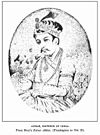Portal:Bangladesh/Selected biography/11

Jalaluddin Muhammad Akbar, also known as Akbar the Great (November 23, 1542 – October 17 or October 27, 1605) was the son of Nasiruddin Humayun whom he succeeded as ruler of the Mughal Empire from 1556 to 1605. He was the grandson of Babur who founded the Mughal dynasty. On the eve of his death in 1605, the Mughal empire spanned almost 500 million acres (doubling during Akbar's reign).
Akbar, widely considered the greatest of the Mughal emperors, was only 13 when he ascended throne of Delhi, due to the death of his father Humayun. It took him better part of two decades to consolidate and bring parts of northern and central india in his realm. During his reign, he reduced external military threats from the Afghan descendants of Sher Shah by waging wars against Afghan tribes, and at the Second Battle of Panipat he defeated the Hindu king Samrat Hemu Chandra Vikramaditya, also called Hemu. Emperor solidified his rule by pursuing diplomacy with the powerful Rajput caste, and by admitting Rajput princesses in his harem.
Akbar was an artisan, artist, armorer, blacksmith, carpenter, emperor, general, inventor, animal trainer (reputedly keeping thousands of hunting cheetahs during his reign and training many himself), lacemaker, technologist and theologian. His most lasting contributions were to the arts. He initiated a large collection of literature, including the Akbar-nama and the Ain-i-Akbari, and incorporated art from around the world into the Mughal collections. He also commissioned the building of widely admired buildings, and invented the first prefabricated homes and movable structures. Akbar began a series of religious debates where Muslim scholars would debate religious matters with Sikhs, Hindus, Cārvāka atheists and even Jesuits from Portugal. He founded his own religious cult, the Din-i-Ilahi or the "Divine Faith"; however, it amounted only to a form of personality cult for Akbar, and quickly dissolved after his death leaving his wife behind. (more)
